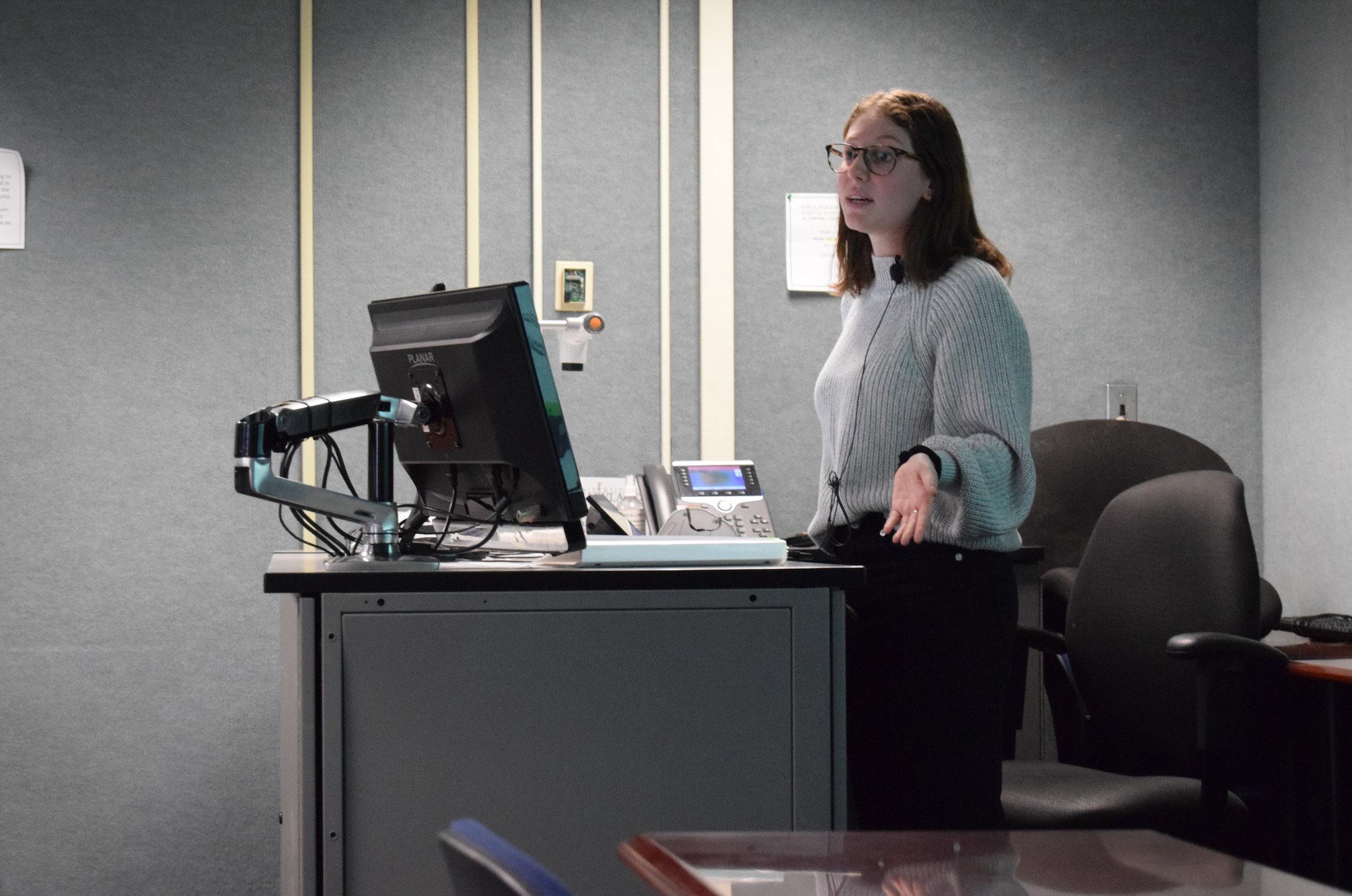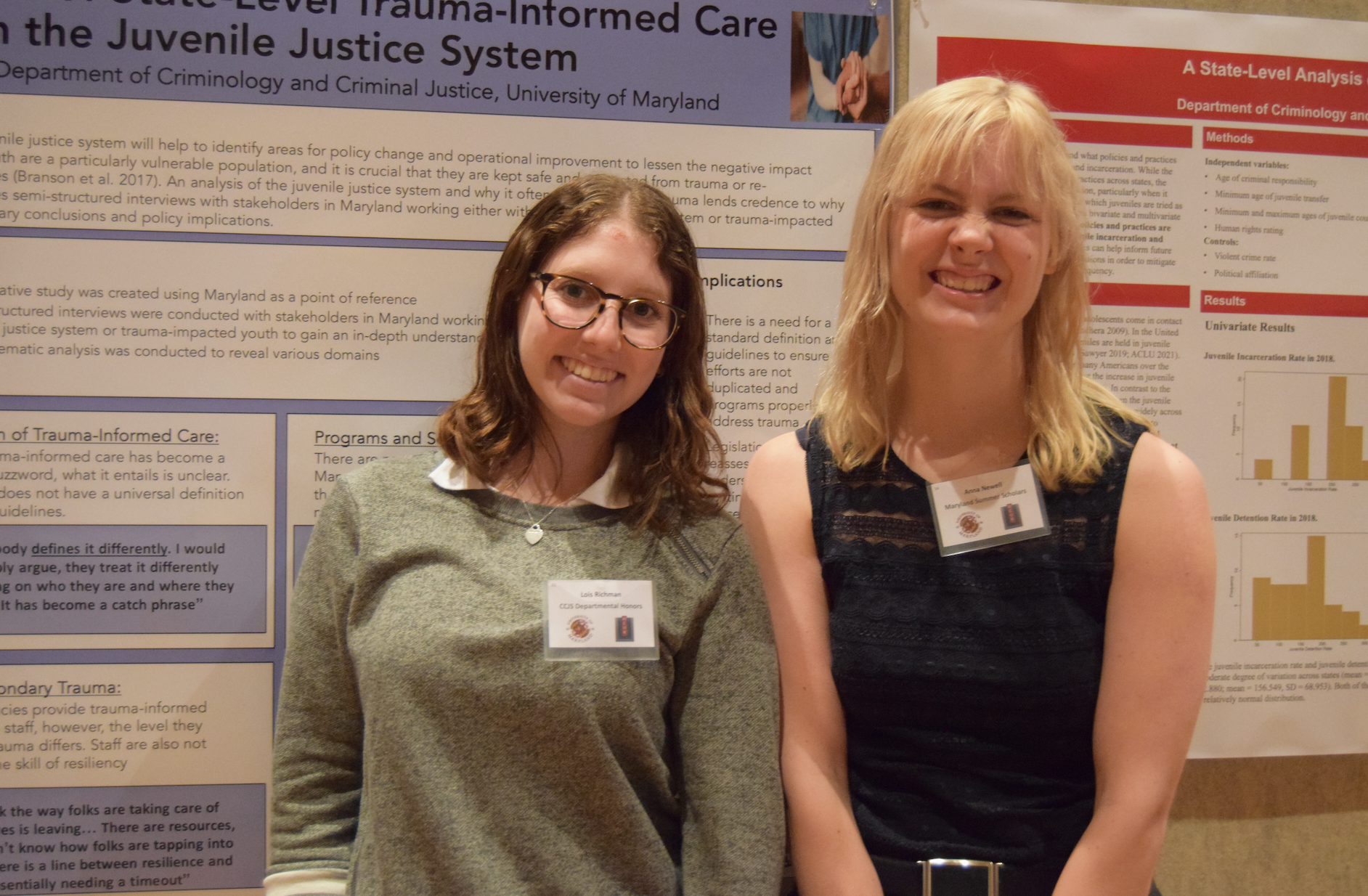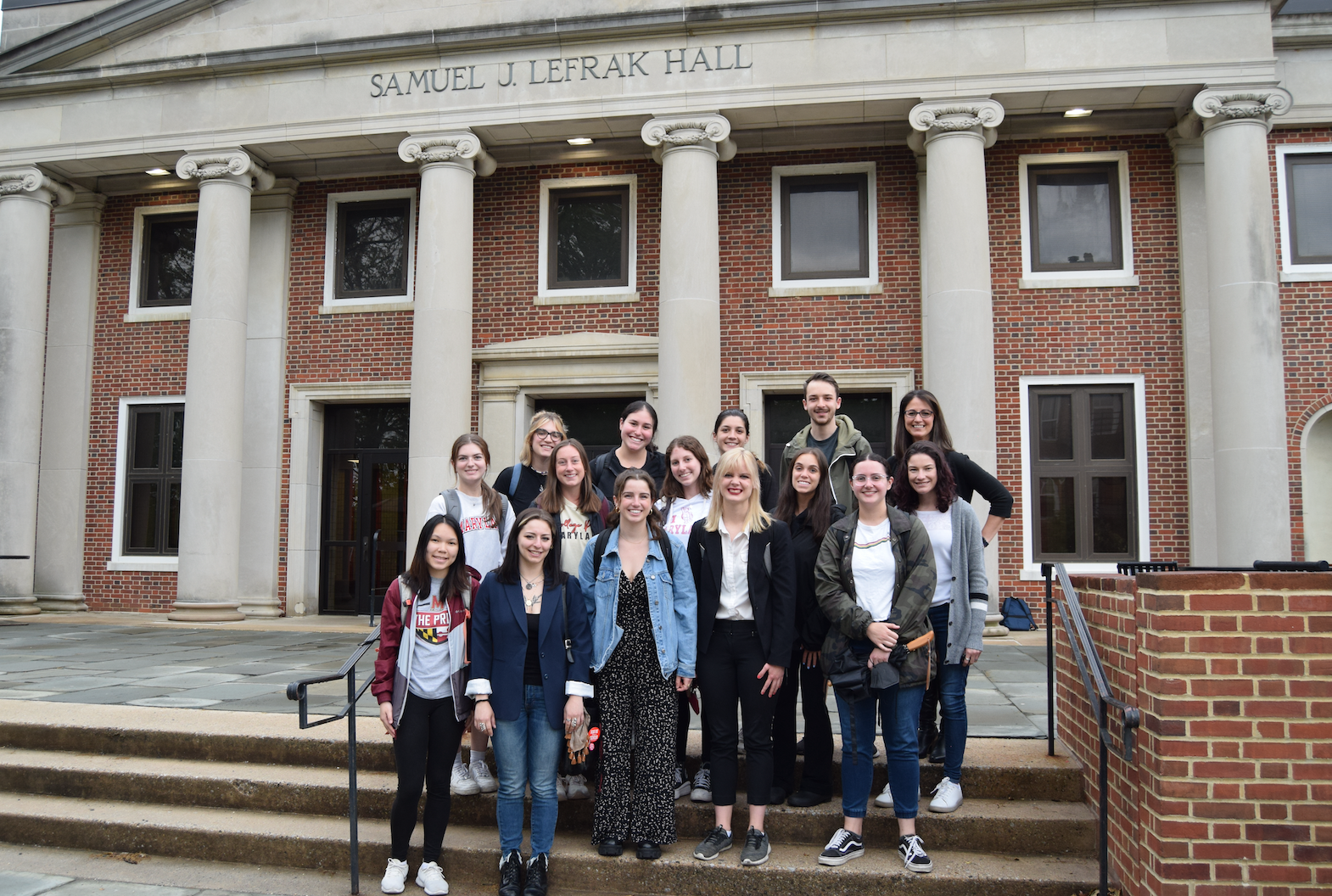When recent CCJS and psychology graduate Lois Richman first considered joining the CCJS honors program, the biggest draw for her was mentorship.
“I was looking to get more involved in individualized research and gain a mentor,” she said. “For most of my undergraduate career, I was in larger classes, and I didn’t necessarily feel that I was getting that one-on-one attention that I was hoping I would be able to gain at Maryland. [In the honors program,] with there only being so many of us under Dr. Bersani, it was going to be a good match for me.”
Dr. Bianca Bersani, associate professor of Criminology & Criminal Justice, has advised three cohorts of students through completion of the honors program and is going into her fourth year as director. Each cohort is limited to 15 or fewer students. The program consists of one year of focusing on the foundational skills of research, and then students use those skills to initiate their own research projects in their second year.
“The honors program is an opportunity for students to engage in a very small group environment where we build a close academic community over the span of 2 years,” Dr. Bersani said. “The program aims to build creative and critical thinking skills by engaging with criminological research and then by conducting independent research, but students also enter into a community with access to resources and mentorship from CCJS Honors Alumni, current CCJS graduate students, guest speakers, and they meet faculty in 1:1 interactions that often build into hands-on research experiences.”
Richman utilized her time in the honors program to study trauma-informed care in the juvenile justice system. She collected her own qualitative data, presented her research through a poster at Undergraduate Research Day, and successfully defended her thesis with the rest of her honors cohort.

Students gain experience that propels them into their futures
Anna Newell, recent graduate in Criminology & Criminal Justice and Psychology, and a fellow member of Richman’s honors cohort, was similarly drawn to the honors program for its unique opportunity to engage in research and gain mentorship.
“Working closely with Dr. Bersani has been like getting an introduction to what it’s like having a primary advisor in grad school,” Newell said. “I’ve also been working with [Dr. Greg Midgette] …having both of those mentors that have pretty different research interests and approaches, getting different perspectives, and getting to work in a program like Maryland’s where all the faculty are extremely qualified has been really useful to me.”

To study state-level juvenile justice policies, Newell created a dataset with 12 variables and performed a multivariate analysis for her thesis. Like Richman, Newell presented her work at Undergraduate Research Day. In the summer of 2021, Newell received funding to support her honors research through the Maryland Summer Scholars program.
“I was really grateful for that,” Newell said of her funding. “It felt like an introduction to what my career could be like, since I planned to go to a fully funded PhD program and would get funding to teach, take classes and work on research. I was definitely really lucky to be able to do that.”
Dr. Bersani emphasized that “the rigor of the honors program positions students to stand out among applicants when applying to graduate school, law school, internships, and/or full employment.”
Newell will attend Penn State in the fall to pursue a PhD in Criminology and will hold a fellowship allowing her to focus on research during her first year of studies.
From one cohort to the next
Dr. Bersani spoke of the meaningfulness of her role as advisor to each honors cohort.
“Directing the program is an honor and rare opportunity to watch a student’s research curiosity develop over multiple years,” she said. “Students often enter the program with little direct experience with research, but a lot of passion. The honors program gives them an opportunity to bring these things together.”

Frank Ricciardone is a current first-year CCJS honors student, who, like Newell, received funding for his research through the Maryland Summer Scholars program. His project focuses on creating an age-crime curve specifically for embezzlement, in contrast to the age-crime curves that usually account for trends in crime overall.
“If you look at [the typical age-crime curve where crime peaks in late adolescence and declines in early adulthood], white-collar crime would all be outliers because you often need a certain degree or certain position to do that…I narrowed it down to embezzlement, which is one of the most prominent white-collar crimes, that way I could get a wide scope and good variety of cases, but within that one topic.”
Ricciardone stated that Dr. Bersani was integral in the process and success of obtaining summer funding; he also acknowledged Dr. Sally Simpson’s role in helping him dig deeper into his area of interest.
“In a lot of classes, we talk about research but don’t actually get to do the research ourselves,” Ricciardone said. “[With working with Dr. Simpson,] I was able to get a feel for what research looks like and the hurdles you deal with in research. She showed me how important each little step is.”
As he works on his age-crime curve project over the summer. Ricciardone expressed that he’s “very excited” to jump into the research process.
“[Being in the honors program this past year] was a fantastic experience and it still is,” he said. “The people in the [honors] class, they all have this same drive, same interest in criminology. You know that these people are the ones putting in the work. It’s a great opportunity and you get to research that you want to research.”
Dr. Bersani recommends that anyone interested in joining the honors program check out the CCJS website’s page on the honors program, which has details including the requirements and the application process. To learn more and determine if the honors program is a good fit for long-term goals, students are welcome to e-mail Dr. Bersani at bbersani [at] umd.edu ().
To contribute to the honors program and undergraduate research like Richman’s, Newell’s, and Ricciardone’s, click here.
“It’s a unique opportunity that not a lot of students have—getting to do your own research project,” Riccardione said. “It’s something I’m genuinely passionate about, and it’s something that I probably wouldn’t have gotten to experience without the honors program.”
To access the undergraduate honors thesis repository, click here.


